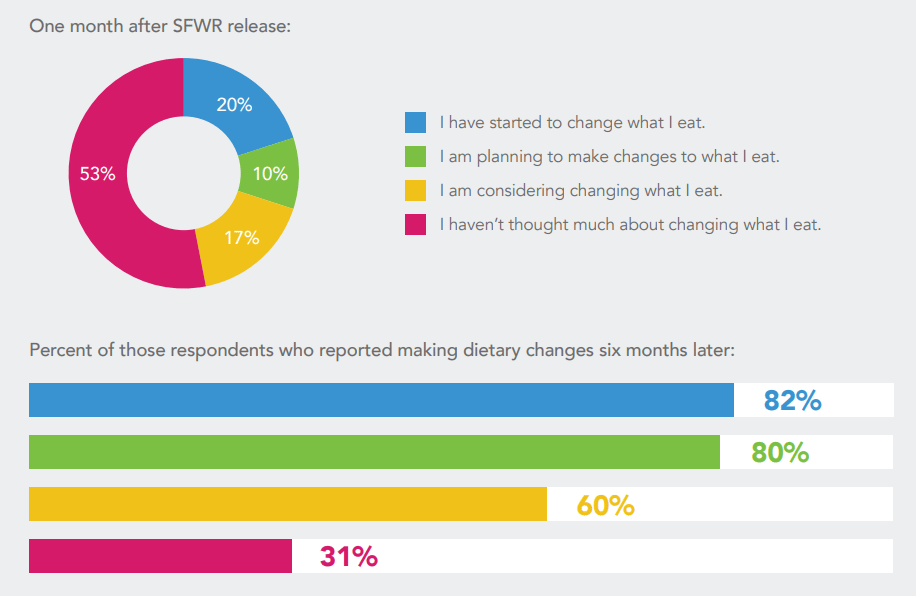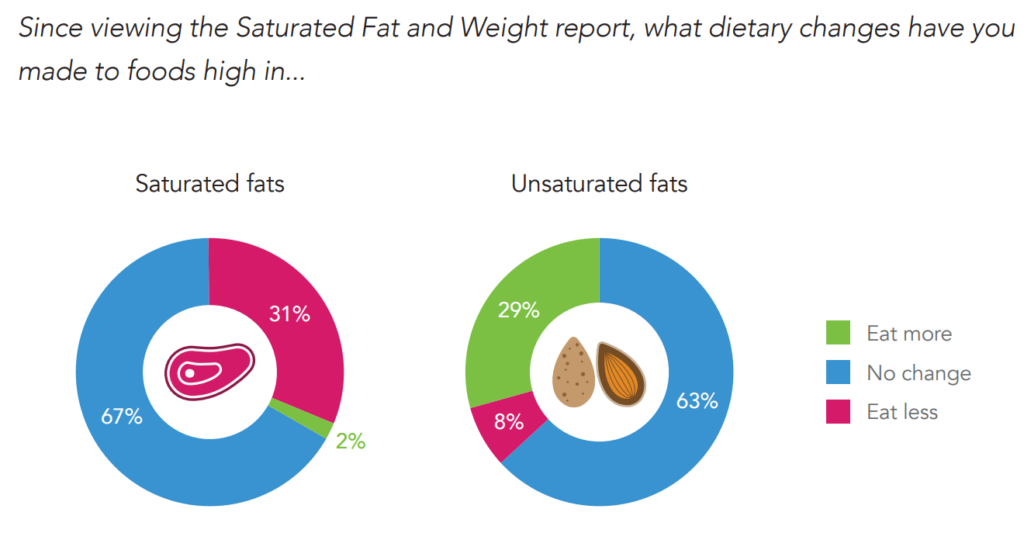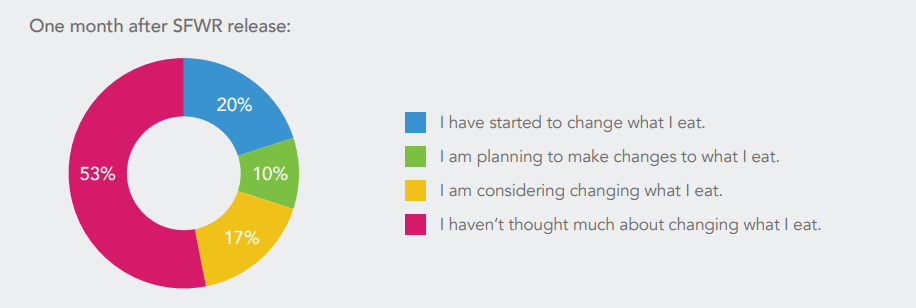By Jey McCreight, Scientist, Research Communications
Most New Year’s weight loss resolutions fail even with the best of intentions – but what if people had a helping hand?
According to 23andMe research, many people reported making healthy changes to their lifestyle after receiving personalized genetic reports with information about diet and weight.
We know this from the data we’ve gathered from our customers who viewed our Saturated Fat and Weight Report. This report, launched in the summer of 2016, looks specifically at how the interaction between saturated fat intake and the rs5082 genotype impacts body mass index, BMI. Those with the GG genotype are likely to weigh more on diets high in saturated fat, and are told that their genetics may make limiting saturated fat intake especially important for maintaining a healthy weight. Because limiting saturated fat intake may also be important for reducing the risk of heart disease1, the report encourages all customers to do so, regardless of their genetic results. 
What we learned is that one month after viewing the Saturated Fat and Weight Report, many participants reported making changes to their diets – and the news was even better six months later.
One month after viewing the report, we asked research participants about their plans to make dietary changes. While about half of participants said they hadn’t considered changing what they eat, some said they had already started to make dietary changes (20%), planned to make changes (10%), or at least considered making changes (17%).
Six months later, the same participants answered another survey about dietary changes in this time period. Of those who had initially reported that they had already started to change what they eat, 82% were still maintaining those dietary changes. 80% of participants who had planned to make changes followed through with those plans, and 60% of participants who considered making changes ended up doing so. Even among participants who had not given it much thought originally, 31% ultimately made healthy dietary changes.
 Those dietary changes were in line with what the Saturated Fat and Weight Report suggested: decrease saturated fat intake, and correspondingly increase unsaturated fat intake.
Those dietary changes were in line with what the Saturated Fat and Weight Report suggested: decrease saturated fat intake, and correspondingly increase unsaturated fat intake.
 Additionally, reduced saturated fat intake was significantly associated with BMI category (p = 3 x 10-44) and genotype (p = 5 x 10-12) as evaluated by a chi-squared test. This suggests that providing personalized results – in this case, the gene-by-environment interaction between rs5082 genotype and dietary saturated fat intake – can encourage people to make healthy lifestyle changes.
Additionally, reduced saturated fat intake was significantly associated with BMI category (p = 3 x 10-44) and genotype (p = 5 x 10-12) as evaluated by a chi-squared test. This suggests that providing personalized results – in this case, the gene-by-environment interaction between rs5082 genotype and dietary saturated fat intake – can encourage people to make healthy lifestyle changes.
 Like any study, these findings may not be generalizable to other populations. Survey questions nonrandomly targeted only people who said they had viewed the report. Respondents were also disproportionately female, and female respondents were slightly more likely to report making changes in response to the Saturated Fat and Weight Report. Finally, given the sensitivities that surround the topic of diet and weight loss, this study may be subject to social desirability bias – the tendency of respondents to answer inaccurately in order to present themselves favorably – as there were no direct measurements of dietary intake.
Like any study, these findings may not be generalizable to other populations. Survey questions nonrandomly targeted only people who said they had viewed the report. Respondents were also disproportionately female, and female respondents were slightly more likely to report making changes in response to the Saturated Fat and Weight Report. Finally, given the sensitivities that surround the topic of diet and weight loss, this study may be subject to social desirability bias – the tendency of respondents to answer inaccurately in order to present themselves favorably – as there were no direct measurements of dietary intake.
We believe that the results presented here support the need for ongoing research looking at the effectiveness of personalized genetic results as a motivator for positive lifestyle change. Although there are limitations, it appears that simply receiving the report may have motivated healthy changes for some people of all genotypes, with the effect being even stronger for those with the GG genotype.“It’s nice to know that there’s a big population out there of engaged, excited customers who want to make healthy changes,” says study lead Sarah Laskey, PhD, Health R&D Scientist at 23andMe. “This is what’s so exciting about our new Weight Loss Intervention study — hopefully that enthusiasm will enable us to make big strides in the science of genetics and weight loss!”
For more details, check out Sarah’s poster from the 2017 American Society of Human Genetics annual meeting.




